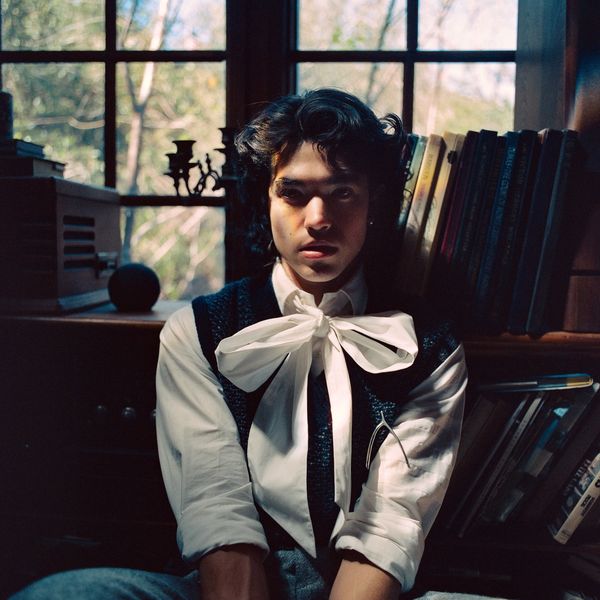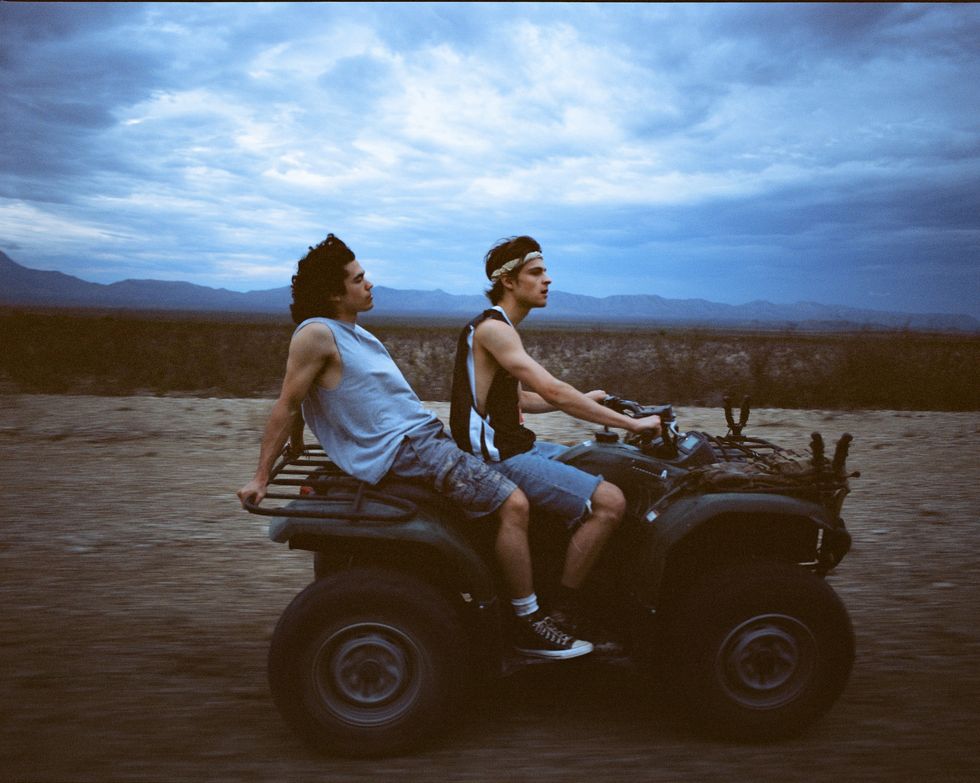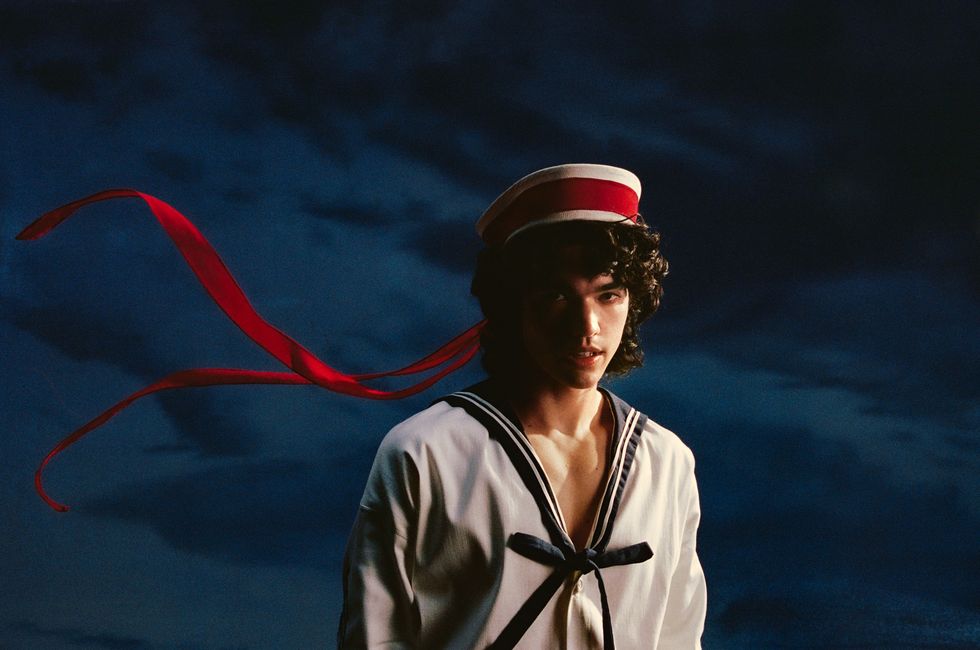
'Wishbone' Is the Album Conan Gray Always Wanted to Write
By Alaska Riley
Aug 19, 2025Conan Gray was just a kid in his Texas bedroom when he started writing songs that could pass as pages from his diary. A decade and three studio albums later, the YouTuber-turned-global pop star returns to his roots on Wishbone. Written mainly in secret while on his recent tour, the album was a personal project of self-discovery and, in turn, confession. “While I was writing this album, I was actively rediscovering who I am,” he tells PAPER. “Writing these songs so diaristically and so honestly is this very thrilling, extremely validating experience, and that's why the whole album ended up that way.”
The accompanying music videos for Wishbone tells a queer coming-of-age story surrounding two original characters: Wilson and Brando. Gray stars alongside long-time friend and former Disney star Corey Fogelmanis in the trilogy for “This Song,” “Vodka Cranberry,” and “Caramel,” borrowing every single nostalgic coming-of-age trope in the book. “I really wanted to create a story that I would have liked to have had when I was young,” Gray confesses. "Two boys falling in love and seeing that they get an ending that is happy. I think that’s really rare.” Take that, Brokeback Mountain!
At its core, Wishbone is what Gray calls his wet dream album: one he’s always wanted to make and allowed him to say what he couldn't say before. From jarring confessionals like “Class Clown” to the simple truth (and warning) that “Behind every kiss is a jaw that could bite,” — Wishbone is a record of self-discovery just as much as it is an invitation for anyone who’s ever been heartbroken to see themselves in his story.
As he prepares to embark on tour for The Wishbone Pajama Show, Gray is less interested in defining his mass appeal than creating a world that even the most “egregiously niche” fans find themselves in, because at the end of the day, that’s who he would have been if he weren’t the one on stage.
Gray sat down with PAPER shortly before the release of “Wishbone” (out now), to discuss his ever-evolving career, the official Wilson and Brando lore, owning his masters and more.
Congratulations on your new album. I've been keeping up with the fan response and it's been really endearing. As an album that you've talked about writing in secret, how are you feeling now that you know you're releasing it out into the world for everyone to hear?
It's definitely a little strange. I think music, in particular, starts so small. I write these songs alone; it's just one person, and then when music gets released, it becomes so much larger than you and so much larger than what you wrote. So at this point, I'm mostly just excited to see what people end up interpreting the songs as, because it's oftentimes so far from the emotion that I felt when I was writing it. I'm also just really proud of my album, so I'm excited for it to be out there in the world.
Touching on the fact that you still write alone and despite the change in scale of the impact that your music is having, do you ever miss how things operated in the beginning?
Not much has changed writing-wise from when I first started. I started writing songs when I was around 11, and I wrote them alone in my bed, and I still write them alone in bed so nothing's really changed there. But definitely things have changed with touring; it's a very different discussion. When I was first touring, when I was, you know, a teenager—
I actually went to your first concert ever in Texas.
No way! Oh my god, it's an honor to be in your presence. We were in the same room with very different forms of each other. Wow, that is so crazy. That was like a 200-person show. So you can attest, things are a little different. I think the biggest thing now is that I'm a lot less scared before I go on stage. Also the kind of show that I get to put on now is just so much more fun, and I feel so grateful that people want to come to the shows. But writing-wise, literally nothing's different. I still write everything alone, and I send them to Dan [Nigro], who I've been making music with since the beginning, and then we make it together in his garage.
Wishbone is reminiscent of the more diaristic songwriting on some of your earlier singles. I'm curious if that was an intentional return or shift in your creative approach, or was that just naturally manifested in how you write your music?
In the beginning, it really naturally manifested. I had a lot that I wanted to say and a lot I needed to get off my chest; then with each new song that I would write, I just felt so good ... so relieved and free and myself. Self-discovery and growth is something that's so complicated because oftentimes you don't even really know who you are until you become it. While I was writing this album, I was actively rediscovering who I am and these bits and pieces of myself that I think I may have lost along the way, or passions that I had that I'd forgotten. Writing this whole album was a huge reminder of the things in life that make me happy, the things that I'm good at, the things that I love doing. Writing these songs so diaristically and so honestly is this very thrilling, extremely validating experience, and that's why the whole album ended up that way. Once the first songs became so diaristic, I was like, “I can't make any song on this album not be this way.”

You talked about the fact that even though there's a lot more people in the audience, you're less afraid to go on stage now. So now that there are a lot more people listening to your music, were you not afraid to be as open and vulnerable this time? Or were there setbacks?
I 100% was afraid the whole time I was making the album. I'd write certain lyrics and think, “I haven't quite said that before, so I don't know if I should say that.” Or moments where I felt like something I was writing was just too me, which is crazy to think — that I could say something that's too me. Those kinds of fears were the things I had to shoot down and tell myself, “No, you have to make art that is honest to you, or else people aren’t even going to relate.” My goal in life with writing music was just to relate to people and tell my story and hopefully find out that more people are like me as well. I just had to force myself to not be a little bitch about it.
This is your first album that you own the rights to under GirlyBoy, which also took me way back to your YouTube days. I was curious how that might have affected your creative approach. Was there more freedom, or more pressure?
To me, this album's assignment was always just be as me as possible. I'm going to do me better than anyone could ever do me. And the aspect of the album that is owning the masters was just serendipitous, just another confirmation of Hey, you should just be as yourself as possible. But I don't think it informed any of the writing or anything like that. It just felt really beautiful that I do get to own the masters of this album.
One of the things that fans have really latched onto is the introduction of the two original characters [Wilson and Brando] on the visual side of the album and seeing their lore unfold. Were there any specific references or films you were drawing inspiration from, or was that something of your own creation?
My one goal was to make an unbelievably classic, veering-on-cliché coming-of-age story. I think we hit every single coming-of-age trope we possibly could. Riding bikes, teasing each other, wrestling, looking at each other in each other’s bedrooms — everything you've seen in every wonderfully nostalgic coming-of-age movie. But the most important part of it to me was that we gave these two characters a happy ending. I really wanted to create a story that I would have liked to have had when I was young: two boys falling in love and seeing that they get an ending that is happy. I think that’s really rare. The music videos are kind of a manifestation of what I wanted versus what actually happens on the album. We referenced so many movies: Brokeback Mountain, The Edge of Seventeen, Lady Bird — our Pinterest board was crazy with these classic nostalgic romance movies.
I was deep on Reddit threads of fans making up their own lore, which was fun to read. Is there any Will and Brand lore that isn’t going to make it into the videos or the album? Any crumbs for the fans?
As I’m saying this, I’m working on the third video, so I don’t really know what will end up in or not. I do think one exciting thing is people placing them in a certain time period; I think a lot of people aren’t entirely clear of exactly the storyline. I'll put it on record for people, the plot is this: we’re childhood best friends who have known each other for a very long time. We’ve both moved away from our hometown, but we come back home for a summer after not seeing each other for about a year and that’s when everything happens. After the summer, I go back to university and try to move on, then ultimately we see the ending unfold. I’ve seen people talk about these two characters and sometimes they’re highschoolers, sometimes they’re much older, but in my mind they’re college age.
Touching back on what you were saying earlier about hoping that you’d seen this sort of story unfold when you were younger ... you’ve also referenced this album as “egregiously niche.” Who do you imagine it to be for or hope finds it and sees themselves in it?
That’s a great question. Honestly, I do think I’m a pretty niche person when it comes to mass appeal. I feel way too niche sometimes. My main goal with writing music, and especially with Wishbone, is to draw in people who’ve been heartbroken. No matter who you are, where you’re from, whether you’ve dated someone or never have dated anybody, divorced or you just had your first crush last week — that feeling of rejection and having to redefine yourself after losing someone is one of the most unanimous feelings of being a human being. So literally just anybody. But I do feel a lot of warmth in my heart when I go to a show and I see someone in the crowd who I’m like “That is me. That was me. That’s who I would have been if I wasn’t on stage right now.” It makes me feel like there’s a reason why I’m able to do this.
The tour starts a month after the album’s release, right? What are you most excited about sharing with those people that you get to see yourself in when you bring it to live audiences?
My show is the final frontier of making music. I make the songs but when I’m making [them] I’m always thinking “Oh my gosh, this is going to be so good during the show.” I’m most excited to see which lines they scream the loudest, because they always end up choosing certain lines or certain parts that I don’t even know are going to happen. So that’s always the most exciting. Also, I think I want the show to feel a bit like a story, very much the same way that the album is; I want it to feel like an arc of getting heartbroken and healing again. I hope that people will feel a little bit more comforted by the end of it.
Speaking of, was there a favorite lyric you wrote when making this album?
Oh god, there’s so many. This album is my wet dream album.
That’s the headline for this interview.
This album was what I always dreamed of saying or making. And just because you want to make something doesn’t mean that you’re at a place where you can. This album was finally a place where I felt like I was in the right place to make [it]. The lyrics of “Class Clown”... honestly so jarringly open and honest that when I was rehearsing the other day: fully holding back tears. I was like “Why am I releasing this song? I’m so stupid. This is way too raw.” But there’s this one lyric actually that I think sums up the whole album. It’s a lyric from “Nauseous,” and I say “Behind every kiss is a jaw that could bite.” It's a very simple lyric, but it’s something I never really thought about. I was in Bangkok when I wrote that song, and I remember writing the line and being like “I’ve never once thought about that, but it’s true.” Behind every kiss, there is a jaw that could bite.
That’s an epic one-liner. I’m gonna start using that. Going back on tour and presumably beginning to write music again, are there specific things you do to prepare or take care of yourself when you’re creating and performing?
Honestly, just training and rehearsing as much as I can. I wish there was a more fun answer, but I just rehearse all the time and practice and work because I want it to be as good as possible. I want to give people the best show that they can watch. So yeah, taking care of myself mentally and just trying really hard to stay focused on the goal, which is to make people feel like they're having a great time at my show and feel seen.
What do you hope to take with you on embarking the Wishbone era that you hope will follow you into the next one?
The one thing I took most to heart with this album is that being yourself is the only option. You think you can become different things for other people, you think you can become other things to make your life easier, but it’s just not true. You always end up having to sacrifice a part of yourself if you’re compromising in any way. I told myself over and over, ‘being myself is the only thing I can do right now.’ That’s something that I hope I feel for the rest of my life, even in times where I’m feeling insecure or scared.

Photography: Dillon Matthew
MORE ON PAPER
ATF Story
Madison Beer, Her Way
Photography by Davis Bates / Story by Alaska Riley
Photography by Davis Bates / Story by Alaska Riley
16 January
Entertainment
Cynthia Erivo in Full Bloom
Photography by David LaChapelle / Story by Joan Summers / Styling by Jason Bolden / Makeup by Joanna Simkim / Nails by Shea Osei
Photography by David LaChapelle / Story by Joan Summers / Styling by Jason Bolden / Makeup by Joanna Simkim / Nails by Shea Osei
01 December
Entertainment
Rami Malek Is Certifiably Unserious
Story by Joan Summers / Photography by Adam Powell
Story by Joan Summers / Photography by Adam Powell
14 November
Music
Janelle Monáe, HalloQueen
Story by Ivan Guzman / Photography by Pol Kurucz/ Styling by Alexandra Mandelkorn/ Hair by Nikki Nelms/ Makeup by Sasha Glasser/ Nails by Juan Alvear/ Set design by Krystall Schott
Story by Ivan Guzman / Photography by Pol Kurucz/ Styling by Alexandra Mandelkorn/ Hair by Nikki Nelms/ Makeup by Sasha Glasser/ Nails by Juan Alvear/ Set design by Krystall Schott
27 October
Music
You Don’t Move Cardi B
Story by Erica Campbell / Photography by Jora Frantzis / Styling by Kollin Carter/ Hair by Tokyo Stylez/ Makeup by Erika LaPearl/ Nails by Coca Nguyen/ Set design by Allegra Peyton
Story by Erica Campbell / Photography by Jora Frantzis / Styling by Kollin Carter/ Hair by Tokyo Stylez/ Makeup by Erika LaPearl/ Nails by Coca Nguyen/ Set design by Allegra Peyton
14 October




